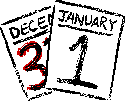Published
by Kathy Paauw
Organizing & Productivity Consultant
Certified Personal & Professional Coach
|
Paauwer
Tools is a Monthly Ezine
December, 2002
Issue 34
|
GETTING
ORGANIZED:
You Can’t Teach an Old Dog New Tricks…or CAN You?
|
|

Were you born disorganized?
If so, do you excuse yourself by saying, “That’s just the way I am! You
can’t teach an old dog new tricks!” ?
So many people seem
unhappy in their professional lives. Very few connect that dissatisfaction
to being disorganized, which can make a good job seem unbearable. The
good news is that it's easy to correct! Some of the most organized people
I know were not “born organized.” That means there is hope! You CAN
teach an old dog new tricks…but only if the dog is motivated to learn.
(Read my article titled Getting
Motivated to Get Organized.)
Many of my clients
are effective decision-makers on a higher level, but they have difficulty
managing the hundreds of micro-decisions they must make daily, often in
the form of paper -- memos and letters to read, phone messages to return,
mail to sort, reports and proposals to review, and to-do lists a mile
long.
Although some people
come by organization more naturally than others, I have worked with enough
organizationally challenged individuals to realize that organization is
a learned skill – a skill that includes a set of methods and tools
to help you arrange your time, physical environment, communications, and
thoughts to meet your goals.
As many as half of
the people whose work involves management of people, information and time
are not good at organizing their work at the most basic level. Since
organization is the cornerstone upon which everything else is built, it’s
clear that many individuals and companies face significant productivity
challenges.
If you question how
fundamentally important organization is in the work environment, consider
the cost of disorganization in these scenarios:
- Two attorneys (I’ll
call them Jim and Tom) were under consideration for partnership in their
law firm. Tom was capable and dependable. Jim was brilliant. Some
people thought that Jim was a shoe-in for becoming partner. But this
brilliant attorney was known for his disorganization. One day a senior
partner received a phone call from an irate client. Although the client
felt that Jim was very skilled at what he did, she reported that he
had not returned her phone calls. After several failed attempts to
communicate with him, her company had decided to terminate their relationship
with the firm. Jim’s disorganization cost his firm a major client, and
it cost him the promotion he’d hoped for. Ultimately, partnership was
offered to Tom, who was not as skilled as Jim but was more organized
and responsive to clients’ needs.
NOTE: A large
number of malpractice suits against lawyers result from failure to file
papers by required due dates.
- The owner of a
small auto repair company (I’ll call him Gus) had a great reputation
for doing quality work. He prided himself on quick turn-around time
so his customers would not be without their cars any longer than necessary.
There was only one problem. Gus hated doing paperwork…including
depositing customer checks and paying his bills. Some of the checks
in his office were for large sums of money and were more than a year
old. Many of the vendors who supplied car parts to Gus’ repair shop
got tired of waiting to be paid. Eventually his largest vendor quit
supplying the parts, and his work came to a standstill. Clients became
angry when Gus could no longer have their cars ready by the promised
time, and his reputation in the community became tarnished. It wasn’t
long before he was faced with the possibility of closing his doors due
to lack of business.
- Poor organization
and communication in the U.S. Federal Bureau of Investigation created
some missteps in failing to act on key information available prior to
the September 11 attacks last year. In one memo, an FBI agent in Phoenix
recommended that his superiors look for al Qaeda members training at
U.S. flight schools. Elsewhere in the FBI was information about the
August arrest of Zacarias Moussaoui, who sought flight lessons in Minnesota
and has since been charged with conspiring in the September 11 attacks.
Had this information been organized in such a way that it could have
been more freely shared within the FBI, as well as with the CIA, the
correlation between this and other known information could have helped
officials foresee and prevent the attacks. After the attacks last year,
FBI Director Robert Mueller briefed the Senate Intelligence Committee
on a plan to restructure the bureau so that such lack of communication
would not occur again.
|
|
The
Faces of Disorganization
|
The average U.S.
executive wastes six weeks per year retrieving misplaced information
on desks or in files. At a salary of $75,000 per year, this translates
to 12.3% of total earnings, or $9225…and that’s just for one person!
In the examples shared
above, disorganization symbolizes a costly drain of resources that has
several faces – the corporate face, the personal (employee) face, and
the public (consumer) face.
The corporate face
of managerial disorganization is measured in lost productivity dollars.
Take the example of the employee above who makes $75,000 per year wastes
one hour a day looking for lost and misplaced information (this is a conservative
estimate). Now multiply that loss in productivity by 10, 50 or 100 managers
who are organizationally challenged. The numbers become alarming when
multiplying the loss.
In addition, it’s
difficult to measure the loss in terms of unfinished projects, sales calls
never made, or innovative ideas that were never pursued as a result of
disorganization. Each manager’s personal inefficiency becomes an operating
inefficiency for the company. Restoring individual performance is essential
to getting the highest productivity return from the investment in management.
The personal face
of managerial disorganization is one you’re probably familiar with – either
because you have struggled with it yourself or because you have worked
with a disorganized colleague and have experienced the results of their
disorder. Basic skills are consistently compromised by inability to organize
one’s environment, schedule, and thoughts. The symptoms: piles of paper,
missed deadlines, constant interruptions, forgetting to follow up or follow
through, inability to find needed information, running late, and the list
goes on. Personal organization is a key trait of many successful people.
The public face
of managerial disorganization is one we are all familiar with. When productivity
goes down in any place of work, the cost of doing business goes up. We
all end up paying for it – in the costs of delivered goods and services,
or…in the case of government waste…with our tax dollars. Sometimes the
cost goes far beyond dollars and cents (September 11, for example).
|
|
The
Costs of Disorganization
|
|

Take this quick survey
to identify your productivity strengths and challenges. Place a Y (YES)
or N (NO) next to each question.
PRODUCTIVITY
SURVEY
|
PAPER / INFORMATION MANAGEMENT |
| ___ |
Do you have difficulty
retrieving information from your desktop, computer, or filing system
within one minute? |
| ___
|
Do others have
difficulty retrieving information from your desktop, computer, or
filing system within 5 minutes when requested to do so? |
| ___
|
Do you struggle
with managing paperwork -- incoming mail, filing, reviewing or submitting
reports, etc.?
|
| ___
|
Are there papers
on your desktop -- other than reference materials -- that you have
not looked at in a week or more?
|
| ___
|
Do you have
difficulty managing your e-mail -- finding messages you’ve kept,
responding to messages, etc.?
|
| TIME
MANAGEMENT |
| ___ |
Do you wish you
had a better system for planning, prioritizing, and achieving your
goals? |
| ___ |
At the beginning
of each work day, are you uncertain about what your primary tasks
are for the day? |
| ___
|
Do you often
find at the end of the day that you have not completed all of the
tasks you planned to accomplish? |
| ___
|
During the last
three months, are there any memos, letters, emails, or messages that
you failed to respond to because they got buried or forgotten about? |
| ___
|
Do you frequently
receive emails, letters, or phone calls that start with, “I have not
heard back from you about…”? |
| ___
|
During the last
three months, have you forgotten any scheduled meetings or appointments,
or any special dates/anniversaries that you wanted to acknowledge? |
| ___
|
Do you take a
loaded briefcase back and forth from work and home more than once
a week? |
| ___
|
Do you experience
frequent interruptions (phone calls, pages, visitors, etc.) that affect
your ability to complete tasks requiring concentration? |
| ___
|
Do you spend
a good portion of your time in crisis mode -- dealing with urgent
tasks, putting out fires? |
| ___
|
Do you have a
huge backlog of reading to do -- professional or trade journals and
publications you need to read? |
| MANAGING
OTHERS |
| ___
|
Do you often
catch people on the run in order to communicate priorities and share
important information? |
| ___
|
Is your staff
uncertain about their assignments, including scope of task, range
of authority, deadline, and how the task fits into the overall purpose? |
| ___
|
Once you’ve delegated
a task, do you often forget to monitor progress and ensure that the
tasks are completed on time? |
| ___
|
Do you often
end up doing tasks that were delegated to your staff? |
|
Add
up the number of YES responses above.
| If
you scored: |
| 0-5
|
Congratulations!
Let's raise the bar a bit, and move it all
the way to extraordinary! |
| 6-8 |
You’re
on the right track, and there’s some room for improvement. |
| 9-12 |
Disaster
ahead if changes not made soon… |
| 13-19 |
Get help
immediately! |
|
Now I know what you’re probably thinking…I don’t have time to get organized!
Am I right?
Do you put "getting
organized" on the back burner because of more pressing things which
need your attention? Until you consistently pay attention to non-urgent
but important tasks -- tasks such as getting organized, weekly planning,
self-care, and other preventive kinds of activities -- the urgent tasks
will continue to multiply, often to a critical state.
If you are organizationally
challenged, here’s the fallacy in thinking that you don’t have time to get
organized. The more you put it off, the more time and money your current
habits will cost you and your company. Ask yourself these questions:
- If I don’t
spend time addressing this now, how will it affect my life and
my work?
- What will
the consequences be of not getting organized?
- In order
to say yes to getting organized, what will I have to say
no to? Looking at the big picture, which will make me
most productive and effective in the long run?
|
|
TANGIBLE
COSTS OF DISORGANIZATION:
|
- Late
payment fees because you didn't make payments by the due
date
- Overtime
pay for support staff staying late to do a "rush"
job you delegated last-minute
- Cost
of replacing and retraining burned out employees who quit
- Cost
to reproduce or repurchase something that you already have
but cannot find
- Fees
to overnight express something that could have been sent
regular mail
- Forgetting
to invoice a client and not getting paid for the work
- Interest
on uncollected fees due to invoices not being mailed out
in a timely manner
- Interest
not accrued on cash and checks that sit around for a long
time before being deposited
- Other:
________________
HARDER-TO-MEASURE
COSTS OF DISORGANIZATION
|
- Inability
to expand your business or workload - you can barely handle
what you already have!
- Missed
opportunities, lack of competitive edge, losing customers
to competitors who are
more organized
- Stress
and burnout that lead to illness, missed work and reduced
productivity
- Other:
________________
|
|
Getting organized
is like going on a diet. There’s no deadline by which you must start,
but the longer you put it off, the more detrimental the consequences will
be, and the harder it becomes to reverse the trend.
|
|
Time
to Take Action!
|

As you wind down
the year, how about scheduling time in your calendar to address your
organizational challenges? Then you can ring in the New Year with a
new set of skills, methods, and tools to help you arrange your time,
environment, and thoughts to meet your goals with less effort and stress.
Here are three tools to help:
-
Sign up for
one of my free
teleclasses in to learn some powerful new organizing
skills. You’ll learn a simple 3-step process to help you eliminate
paper pile-up forever.
- The survey above
will help you identify where you’ll need to focus to begin addressing
your productivity challenges. If you need assistance assessing your
needs, creating an action plan, or learning new skills, methods, and
tools to increase your productivity, contact me for a complimentary
consultation.
- Check out The Paper
Tiger – a remarkable tool that guarantees you’ll find anything in 5
seconds or less – guaranteed. View
a PDF file for more information.
|
|
|
|
Buried
in Paper? Learn a simple 3 step process to help you eliminate
paper pile-up forever.
Do you
want to learn how to handle mail and other paper as it comes
into your home or office? Would you like to have a system
that helps you remember important follow-up?
This
class is designed for those who feel like you’ll never catch
up…like you’re on constant overwhelm -- and it manifests
itself in the form of piles of paper everywhere. During
this introductory teleclass you’ll learn a simple 3-step
process that will help you:
- Focus
on what matters most.
- Remember
important follow-up at the appropriate time.
- Efficiently
handle mail, filing, and other repetitive tasks.
- Enjoy
a less cluttered environment by eliminating paper pile-up
forever!
Come
prepared to take away some tools that you can start using
right away. This is an introduction to my four-week teleclass
series on De-Cluttering Your Life, beginning in January.
This
free one-hour class will be taught at four different times
and dates. Choose a date that is most convenient for your
schedule:
Click here for more information. |
|
Our
Mission
I help individuals committed to moving their lives forward in powerful ways
by decluttering their schedules, spaces, and minds.
Our
web site has received the
Internet Clinic Award,
based on the following criteria:


Table of Contents for Past Issues
Products
Paauwer
Tools is a free monthly newsletter.
To subscribe to
this newsletter click here.
We appreciate your forwarding
this to your friends and colleagues you think might benefit
from reading it. Your recommendation is how we grow.
Anyone can subscribe. We request that you keep the broadcast
intact, including the contact and copyright information.
You
are free to use the material from my articles in whole
or in part on your web site or ezine (email newsletter)
as long as you include the attribution below and also
let me know where the article will appear.
This
article is by Kathy Paauw of Paauwerfully Organized.
Kathy's web site is a comprehensive resource
devoted to helping busy professionals and small
business owners de-clutter their schedules, spaces,
and minds so they can focus on what's most important. Kathy
is an organizing & productivity consultant,
certified business & personal coach, and
speaker. Visit her website for free resources and valuable productivity
tools visit http://www.orgcoach.net . |
Send your comments, questions,
and suggestions for future newsletter content to me.
I'd love to hear your thoughts!
Warm regards,
Kathy Paauw, Paauwerfully
Organized
425-881-6627 |

Copyright © 2002
Kathy Paauw, All Rights Reserved.
|


